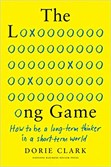- Behaviour
Playing a Longer Game
Dorie Clark’s new book shows how to be a long-term thinker in a short-term world and why it matters
In Greater: Britain After the Storm, Penny Mordant and Chris Lewis argue that all reforms, in politics, government and markets, need to be set within a long-term, practical, national, mission. The same is true for any business.
Politicians are notoriously short-term, election-cycle focused, but business leaders are often worse—focused on the next quarter’s results and afraid of a slashed bonus or a fall in stock price. Besides, they tend to be over-stretched, time-pressed and too stressed to think any distance ahead.

The pandemic, added to the decade's massive technological and market disruptions, has created an environment where the emphasis must necessarily be on leadership agility and managing short-term change—but that is not enough. Introducing her new book, The Long Game: How to be a Long-term Thinker in a Short-term World, Dorie Clark stresses “It takes courage to be a long-term thinker, and a willingness to buck the near-term consequences. But the payoff can be enormous.”
Well-illustrated by her own experience, Clark acknowledges the pressure business leaders are under and how difficult it is to see beyond day-to-day duties and operational concerns, and offers a timely antidote—a playbook for any leader struggling to find and focus on a long-term mission for their team, their organization, or for themselves and their career.
She opens the book with a section on how to create “white space” for long-term thinking, starting with a chapter on “the real reason we’re all so busy,” and looking at opportunity cost and the importance of saying no. At the core of the book, she then considers the need for exploration and setting the right goals. She urges us to “think in waves”—Rome wasn’t built in a day—and the need to tap into the power of doing small things persistently over time to achieve ultimate goals—making small changes now that will have a profound impact on future success. Here she also advises an alternating “heads-up, heads-down” routine—heads-up seeking connections and exploring new ideas, heads-down focusing on execution.
Navigating the journey Clark describes, requires courage and endurance and the development of these three “habits of mind”: Independence to stay true to yourself and avoid short-term people pleasing; Curiosity in order to experiment and find the path to making the best possible contribution; Resilience to persist through failures and setbacks.
Too often the pressure leaders are under steers them towards doing what’s easy, what has worked before, or makes a good impression in the moment. Getting past this, finding and maintaining a clear long-term mission can be about defining a strategic route to sustained growth or it can be about our own career or personal life.
Why does playing the Long Game matter? If you have a bigger vision than your narrow short-term or selfish goals you will attract people to your cause, you will be a better leader.
About the author: Dorrie Clark is a consultant and keynote speaker. She teaches at Columbia Business School and Fuqua School of Business, Duke University, and has been named as one of the top 50 business thinkers in the world byvThinkers50.
.............................................................................................................................
ARTICLES YOU MIGHT LIKE
RESEARCH
LBS and ESMT study identifies the danger of citing information based on the ‘gist’ of the truth rather than the ‘literal’ truth
DEVELOPING LEADERS QUARTERLY MAGAZINE AND WEEKLY BRIEFING EMAILS

































